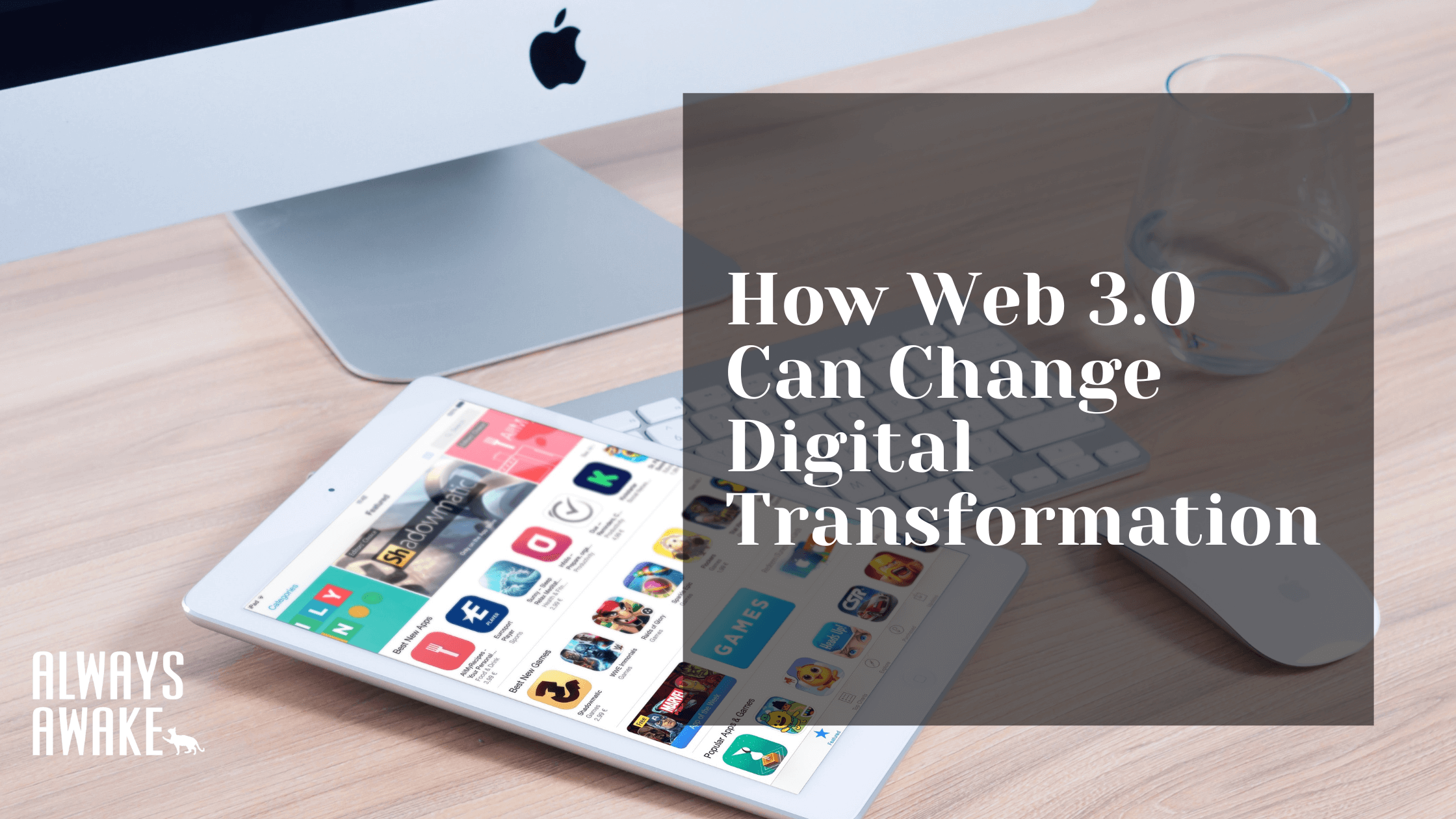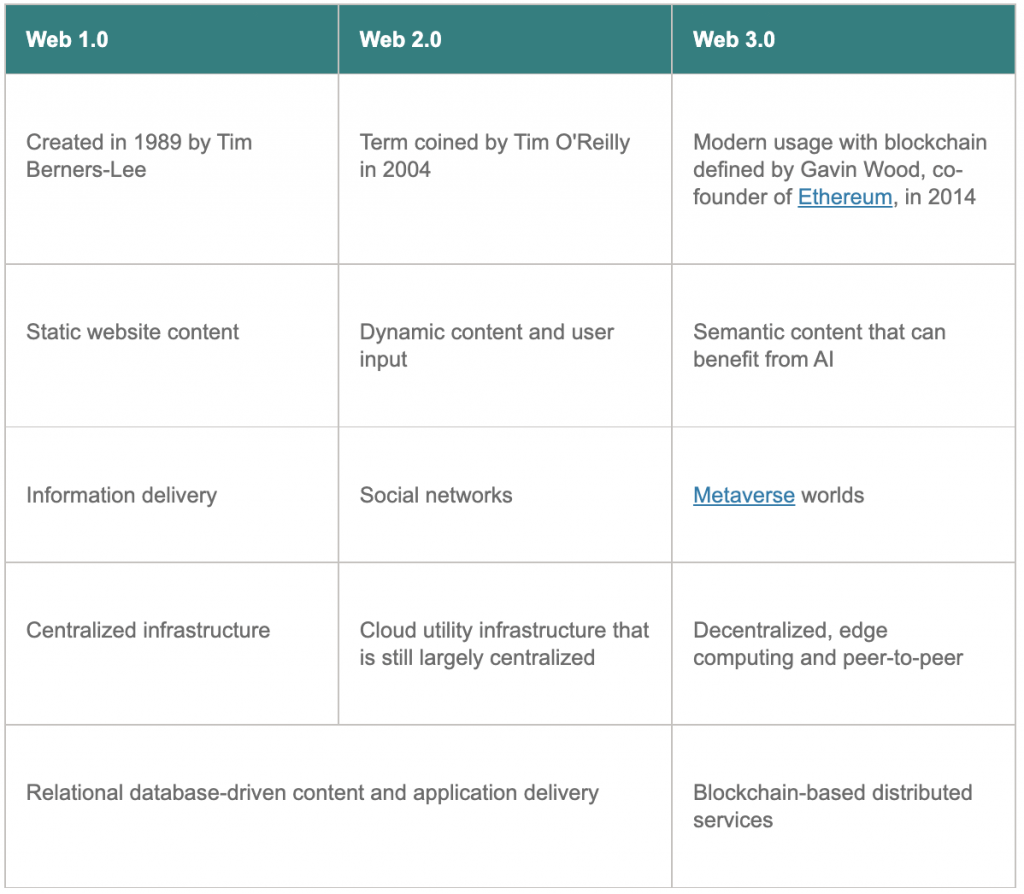
How Web 3.0 Can Change Digital Transformation
Many are still confused about what Web 3.0 is and what it means for businesses. Oftentimes confusing Web 3.0 as crypto space only, especially since everyone seems to be talking about NFT, Metaverse, and they are not wrong as Cryptocurrencies are one of the many Web 3.0 applications. Let’s just say with Web 3.0, innovation is at the next level!
So what is Web 3.0?
Web 3.0 is the third iteration of the World Wide Web, focused at decentralizing data links for a more personalized, enjoyable, and speedier Internet experience. It makes use of the Semantic Web’s machine learning, artificial intelligence, and blockchain security mechanisms to communicate data with online apps while keeping information secure.
The Semantic Web is like webpages of data that have been linked together and structured in such a way that it can be easily processed by robots, rather than by humans. Decentralization, openness, and an interactive user experience on the internet are major elements of Web 3.0.
The move from Web 2.0 to Web 3.0 is unavoidable, and this new internet stage offers numerous advantages, including:
AI Implementation: The use of AI will be more visible. As a result, the technology may use the internet to propose items, films and other content to users based on their previous searches.
Open Source: The networks are built on open-source software, which allows an open and accessible community of developers to run applications in public view.
Decentralization: Web 3.0 will be decentralized, allowing users to engage with data using artificial intelligence (AI) and machine learning (ML). Additionally, there is a mix of Semantic Web and AI principles.
Blockchain-Based: The building of decentralized applications and services is made possible by blockchain. Data and connections between services are distributed in a way that is different from centralized database infrastructure with blockchain. In a decentralized society, blockchain can also provide an immutable ledger of transactions and activities, allowing for verifiable authenticity.
How is Web 3.0 different from Web 1.0 and Web 2.0?
Each iteration of the web has a significant variation in how data is shared and interacted with.
Web 1.0 – is a read-only web whereby we can only read website content.
Web 2.0 – is a read-write web that allows us to consume as well as create content.
Web 3.0 – is a read-write-interact web in which we can employ AI and machine learning to read, write, and interact on the web.
Source: techtarget.com
So what does Web 3.0 mean for Businesses?
Businesses have been able to expand and develop with access to a global market as a result of the transition from a static Web 1.0 to an interactive and dynamic Web 2.0. As a result of Web 2.0, the marketing and commercial worlds have changed tremendously. The current dynamic has spawned new business models, platforms, and channels. Some brands failed to adapt and are now obsolete.
With Web 3.0 on the horizon, brands must adapt if they want to be relevant in the next ten years. We should expect certain companies to win large and others to lose big if the distribution is anything like web 2.0.
The internet will change as Web 3.0 takes traction and technologies like blockchain develop, and businesses will have to adapt to keep up. Web 3.0 improves security while simultaneously emphasizing transparency and accountability.
Why does WEB 3.0 aid in the digital transformation of businesses?
Web 3.0 assists firms in their digital transformation from their existing condition to a more advanced version. As the future of internet commerce, Web 3.0 is vital for digital transformation in the next years for a variety of reasons:
Brands to customer interactions are more personalized: With the use of artificial intelligence and machine learning, Web 3.0 enables for more personalized internet interaction. Customized browsing and permissionless access will provide users greater freedom and control.
More improved search assistance: For a better internet experience, voice search technology backed by artificial intelligence will give consumers with humanized digital search assistants.
You own all of your data: Web 3.0 will allow users to own their data and digital footprints as tokenized digital assets, removing the need for centralized repositories. Other platforms will not be held responsible for data consumption. With mutual ownership and governance, it also lowers intermediary dependency.
Better security and privacy: Peer-to-peer connectivity will grow as Web 3.0 takes hold, allowing for greater privacy and security while sharing more data.
Increase Trust: Web 3.0 will increase the total trust value of online services by providing more freedom, control, security, and privacy. The semantic web will lessen reliance on middlemen and archives, making organizations more future-proof in terms of technological adoption.
Why does WEB 3.0 aid in the digital transformation of businesses?
Web 3.0 will usher businesses and individuals into a future in which everyone has complete control over and easier access to information, as well as the ability to monetize their data and internet usage. To deliver a solid user experience, it will improve the overall security, privacy, and accessibility of information on the internet. The third version of the World Wide Web will promote more transparent and tailored search results, as well as the usage of data, in order to provide a more interactive and immersive web experience.
Web 3.0 will have a substantial impact on website design, optimization, and online data accessibility in terms of digital marketing, SEO, and other internet services. Web3 will soon touch business, and the metaverse will be the next stoppage for everything we access and interact with on the internet, thanks to our growing reliance on machine learning and artificial intelligence.


